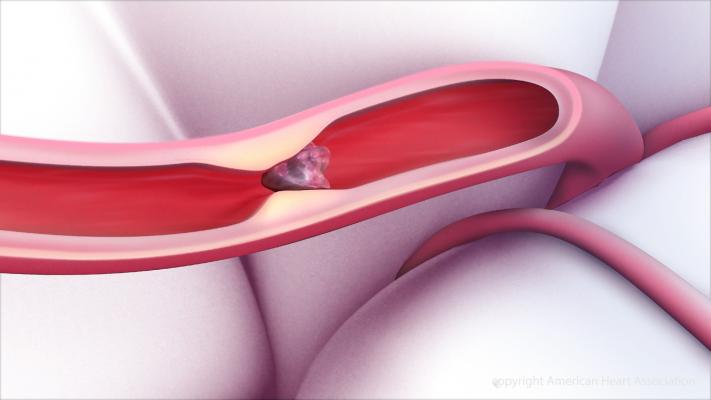
June 7, 2018 — Results from an international clinical trial show that combining clopidogrel and aspirin following a small stroke or experiencing minor stroke symptoms decreases risk of a new stroke, heart attack or other ischemic event within 90 days. The combination therapy was also associated with an increase in major bleeding, although many of those episodes were non-fatal and did not occur in the brain.
The results, published in the New England Journal of Medicine, were presented at the 4th European Stroke Organization Conference, May 16-18, 2018, in Gothenburg, Sweden. The study of more than 4,880 participants was supported by the NIH’s National Institute of Neurological Disorders and Stroke (NINDS).
“These findings are likely to have a global effect on clinical practice, as these drugs are easily available in many hospitals and clinics,” said Walter Koroshetz, M.D., director of NINDS. “As the benefit of the combination was concentrated in the first two weeks while risk of bleeding was constant over 90 days, it may be especially valuable in acute management of a minor ischemic stroke or transient ischemic attack (TIA).”
The Platelet-Oriented Inhibition in New TIA and minor ischemic stroke (POINT) clinical trial follows an earlier study, which showed benefits of this drug combination in a Chinese population. POINT was conducted to see whether the benefits could be expanded to a more diverse group of patients.
The study — led by S. Claiborne Johnston, M.D., Ph.D., dean and professor of neurology at Dell Medical School at The University of Texas at Austin — included patients who had experienced either a minor stroke or a TIA, in which blood supply to a part of the brain is briefly stopped and can be a risk factor for a larger stroke. Study participants were given clopidogrel and aspirin, or aspirin alone, to see whether the combination therapy could prevent a larger stroke within three months.
Johnston’s team found that the combination of clopidogrel and aspirin prevented more ischemic events, such as stroke and heart attack, compared to aspirin alone. The results showed that 5 percent of patients in the combination therapy group and 6.5 percent of patients taking only aspirin experienced such an event within 90 days. However, the combination therapy was associated with a greater risk of major bleeding, or hemorrhage, than aspirin alone. In the aspirin-only group, 0.4 percent of patients suffered a major hemorrhage but 0.9 percent of patients taking clopidogrel and aspirin had severe bleeding.
The findings suggest that for 1,000 patients, clopidogrel plus aspirin would prevent 15 ischemic attacks but may cause five instances of major hemorrhage. The majority of these hemorrhages occurred outside of the brain and were not fatal.
“We saw a real benefit with the combination therapy, but that treatment does come with a risk,” said Johnston. “Overall, the risk of severe bleeding was very small, but it was not zero.”
The study was stopped early because the combination therapy was found to be more effective than aspirin alone in preventing severe strokes, but also due to the risk of severe hemorrhage.
Clopidogrel and aspirin prevent platelets from sticking together and forming clots in blood vessels, although they work in different ways. Aspirin blocks molecules that activate the clotting process while clopidogrel prevents a specific chemical from attaching to a receptor.
“Each year, strokes cause millions of disabilities around the world and preventing many of those would lead to not only tremendous health savings, but improved quality of life for many individuals and their families,” said Johnston.
POINT was supported by the NINDS’ Neurological Emergencies Treatment Trials (NETT) Network, a system of research institutions dedicated to emergency issues such as stroke.
More research is needed to investigate ways to lower the risk of bleeding and examine the impact of treatment timing on outcomes. In addition, future studies may help identify similar drugs that are associated with fewer adverse events.
For more information: www.nejm.org
Reference


 August 28, 2023
August 28, 2023 









